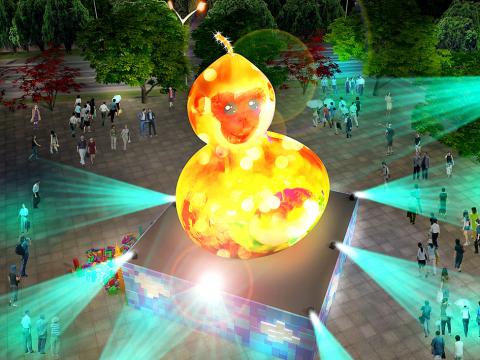A large lantern commissioned by the Taipei City Government to be displayed during next month’s Taipei Lantern Festival has drawn the ire of Internet users, with many calling the decoration “ugly.”
Lin Shu-min (林書民), the artist who created the piece, told a news conference on Wednesday last week that the 14.2m lantern is a cross between a monkey and a gourd, which is seen in Chinese-speaking communities as an auspicious symbol for people who want to have children.
The monkey has a red face and a bright yellow body, with images of a goldfish and a peach — both auspicious symbols — painted on its belly and back, and a gourd stem sticking out from the top of its head.

Photo courtesy of Taipei Department of Civil Affairs
The lantern was fleshed out from bubble foam sheets and is to be lit using a technique known as “light sculpture,” which would allow different patterns and animations to be projected onto its surface, Lin said.
The Taipei Department of Civil Affairs said that the lantern cost NT$9 million (US$267,459).
Netizens began criticizing the lantern soon after pictures of it were released online.
“This looks like a monkey wearing pantyhose,” a user named Harry Young said on YouTube.
“Do not try to fool me. This is totally [Dutch artist Florentijn Hofman’s] yellow rubber duck,” a YouTube user named Hsia Kuo-jen (夏國仁) said.
The lantern looks like the “bastard son of a monkey and a duck,” lawyer Lu Chiu-yuan (呂秋遠) wrote on Facebook.
Lin responded with modesty when asked by reporters to comment on the mounting criticism.
“I think that it is a great thing people are now paying more attention to issues related to arts and design,” he said.
Lin said that he got the inspiration for the monkey’s gourd-shaped body from the global trend of low birth rates.
The lantern can be seen at the Taipei Expo Park from Feb. 20 to Feb. 29.
It is not the first time design outsourced by the city government has come under fire from the public.
A Formosan black bear that was selected as the mascot for next year’s Summer Universiade in Taipei also sparked negative reviews.
The mascot was announced last year after going through three revisions, including a design by children’s show host Patty Hsu (徐千舜), which was paid for by the city government after it received the majority of votes on the city’s online polling platform, i-Voting.
Hsu’s design was later scrapped by the city government without explanation and the job to design a new mascot was given to Asia University professor of visual design Yu Ming-lung (游明龍), whose creation cost the city NT$2.88 million.

Taiwan would welcome the return of Honduras as a diplomatic ally if its next president decides to make such a move, Minister of Foreign Affairs Lin Chia-lung (林佳龍) said yesterday. “Of course, we would welcome Honduras if they want to restore diplomatic ties with Taiwan after their elections,” Lin said at a meeting of the legislature’s Foreign Affairs and National Defense Committee, when asked to comment on statements made by two of the three Honduran presidential candidates during the presidential campaign in the Central American country. Taiwan is paying close attention to the region as a whole in the wake of a

President William Lai (賴清德) has appointed former vice president Chen Chien-jen (陳建仁) to attend the late Pope Francis’ funeral at the Vatican City on Saturday on his behalf, the Ministry of Foreign Affairs said today. The Holy See announced Francis’ funeral would take place on Saturday at 10am in St Peter’s Square. The ministry expressed condolences over Francis’ passing and said that Chen would represent Taiwan at the funeral and offer condolences in person. Taiwan and the Vatican have a long-standing and close diplomatic relationship, the ministry said. Both sides agreed to have Chen represent Taiwan at the funeral, given his Catholic identity and

Chinese Nationalist Party (KMT) Chairman Eric Chu (朱立倫), spokeswoman Yang Chih-yu (楊智伃) and Legislator Hsieh Lung-chieh (謝龍介) would be summoned by police for questioning for leading an illegal assembly on Thursday evening last week, Minister of the Interior Liu Shyh-fang (劉世芳) said today. The three KMT officials led an assembly outside the Taipei City Prosecutors’ Office, a restricted area where public assembly is not allowed, protesting the questioning of several KMT staff and searches of KMT headquarters and offices in a recall petition forgery case. Chu, Yang and Hsieh are all suspected of contravening the Assembly and Parade Act (集會遊行法) by holding

Lawmakers from the Democratic Progressive Party (DPP) yesterday established a friendship group with their counterparts in Ukraine to promote parliamentary exchanges between the two countries. A ceremony in Taipei for the Taiwan-Ukraine Parliamentary Friendship Association, initiated by DPP Legislator Chen Kuan-ting (陳冠廷), was attended by lawmakers and officials, including Deputy Minister of Foreign Affairs Francois Wu (吳志中) and European Economic and Trade Office in Taiwan Director Lutz Gullner. The increasingly dire situation in Ukraine is a global concern, and Taiwan cannot turn its back when the latter is in need of help, as the two countries share many common values and interests,